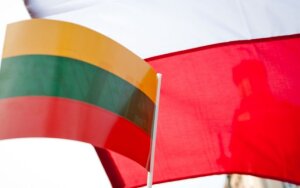- March 14, 2013
- 252
Filut: Big phobias of a small nation

A small nation or nationality usually suffers from a syndrome of complexes and phobias towards greater countries. Lithuania still has that something in relation to Poland and Russia. Russkis got in Lithuania’s bad books because once they seized this country so effectively that Lithuania managed to break free of the Soviet yoke only after the collapse of the Soviet Union.
The occupation period made Lithuania’s life a misery, many inhabitants in this country, Poles and Lithuanians, became well-acquainted with Siberia. Unfortunately, in many cases our compatriots paid for that acquaintance with their health and life. Not many of them returned to their family homes and beloved Vilnius Region and Lithuania. Calculating dispassionately, however, it should be noticed that the period of the Soviet occupation contributed to the economic growth of Lithuania, Latvia and Estonia. Russians built new cities, production plants and the Ignalina Nuclear power Plant was constructed thanks to them. The territory of the country expanded with Vilnius, previously owned by Poland and Memel taken from Germans, known today as Klaipėda.
Therefore, it is unwise to be surprised that even the burp of a host in the Kremlin causes convulsions of Lithuanian politicians. It is so to such an extent that several years after gaining independence, the country flinged itself into Brussels’ arms. However, even not very attentive observer will manage to notice that membership in the European Union and NATO is not a cure-all for political fears. Everyone remembers a lesson in humility given by the Third Reich to Poland with British and French reassurances in 1939.
Regrettably, hysteria in Lithuanian authorities is also evoked by the Polish community centred mainly around Vilnius and Vilnius and Šalčininkai district municipalities. At first glance, the hysteria and a smear campaign against Poland, still present in the Lithuanian society, appear to be something incomprehensible and monstrous to the Poles from the Crown. Yes, reader, anti-Polonism in Lithuania has its sources as well as anti-Moscow hysteria. To discern animosities between Lithuania and the Crown, one would have to refer to the early Middle Ages – the times when, according to some of the more orthodox Lithuanians, Jogaila (Władysław II Jagiełło) betrayed Lithuania by converting to Christianity and seizing royal power in Poland. What is worse, it were Poles, reluctant to the neighbour growing in strength, that were to intercept Roman envoys delivering the crown for Vytautas.
Moreover, according to the historical sources, noblemen from the Crown aspired to subdue the Grand Duchy of Lithuania at any cost, which, by the way, did not feel to be united and unanimous with the Crown.
The burning bonfires of anti-Polish hysteria also fuel the wrangle of Vilnius taking place on the orders of Piłsudski who caused General Żeligowski’s Mutiny. What an irony of fate, Piłsudski – Lithuanian to the core, is a hero for Poles whereas for Lithuanians he will probably for ever be a fiendish person. I hold a view that the fear of history which may repeat itself and one day the Poles will again take Vilnius for themselves, lies dormant in the hearts of most of Lithuanians. The fear is, in turn, accelerated by completely natural for many Poles (those from the Vilnius Region, from the Crown and those scattered around the world) a sentimental attachment to lost forever borderlands of Lithuania, Ukraine and Belarus.
An astute observer of the Polish-Lithuanian social and diplomatic relations will notice without too much trouble that here the sources of disagreements are hidden. After all, the Poles themselves contribute to anti-Polish hysteria to a large extent. I know that it is quite risky and paradoxical claim. Since, in what way the Polish minority, fighting for their rights to national identity and language, contributes to the attempt of discrimination against itself ?! Any attempts to put pressure on the minority cause sharp defense reaction which results in new attack. Fight, however, consolidates the Polish minority in Lithuania, but at the same time it limits the Polish community and leads them to shut in their own ghetto.
As a result of it, we have two communities in one Lithuania: the Polish minority, living under constant threat of denationalisation and the Lithuanian, looking with schizophrenia at the Poles who, according to many, strive after the proclamation of Polish autonomy (let’s remind that soon after gaining independence by Lithuania, such autonomy nearly came into existence in the Vilnius Region). When an ordinary Lithuanian hears about the requirements of Polish minority, he/she immediately retorts: ‘The Poles talk a lot about what they are entitled to, but little about their duties towards the country. The only thing they are preoccupied with is the organisation of protest rallies, demonstrations and demanding privileges’.
Of course, those accusations are not very fair and right, but they are what they are. Polish objections are equally hurtful for Lithuanians. And here, unfortunately, the circle ends up. Is there a hope for the improvement and for Lithuanian and Pole to be like two nephews for fighting and drinking? Perhaps, but I’m looking ahead more and more pessimistically so I would rather not to ask for whom the bell tolls…
Source: http://pl.delfi.lt/opinie/opinie/filut-duze-fobie-malego-narodu.d?id=60897985
Tłumaczenie Barbara Rożek w ramach praktyk w Europejskiej Fundacji Praw Człowieka, www.efhr.eu. Translated by Barbara Rożek within the framework of a traineeship programme of the European Foundation of Human Rights, www.efhr.eu.

